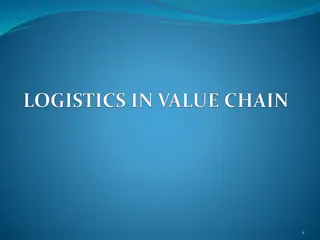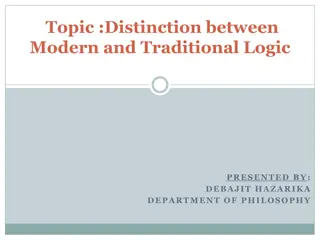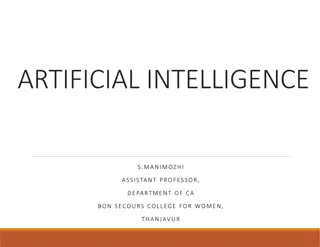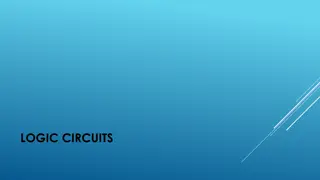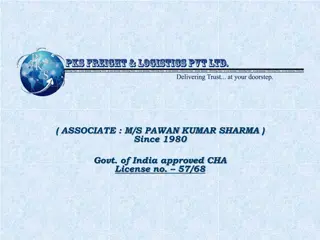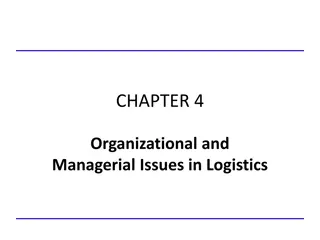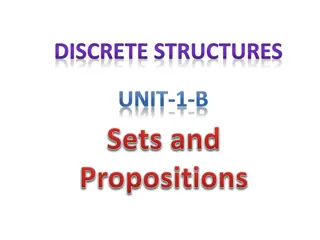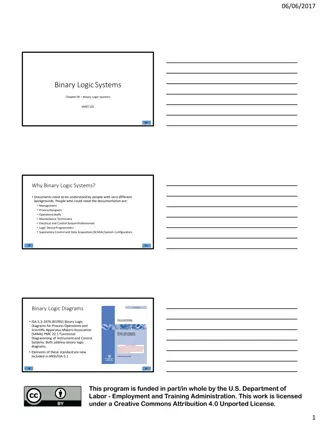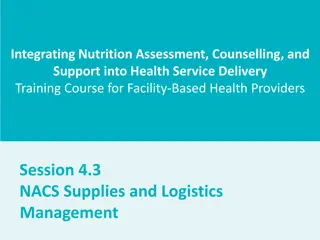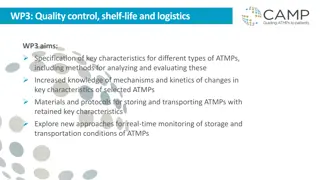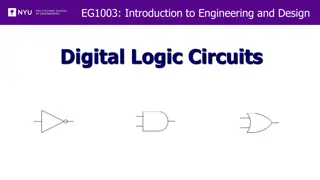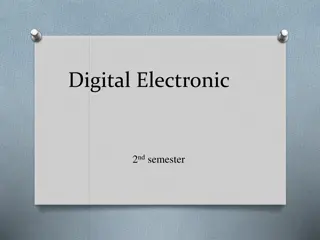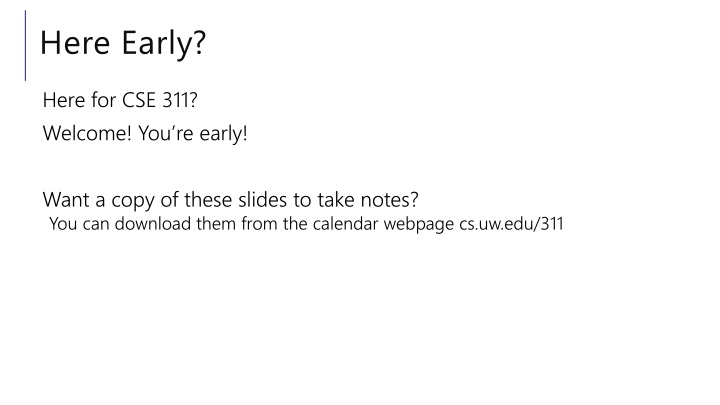
Introduction to CSE 311: Course Logistics and Propositional Logic
Discover key information about the CSE 311 course, including logistics, the COVID policies in place, staff details, and important reminders for students during the ongoing pandemic. Get an overview of what to expect and how to prepare effectively for the semester ahead.
Download Presentation

Please find below an Image/Link to download the presentation.
The content on the website is provided AS IS for your information and personal use only. It may not be sold, licensed, or shared on other websites without obtaining consent from the author. If you encounter any issues during the download, it is possible that the publisher has removed the file from their server.
You are allowed to download the files provided on this website for personal or commercial use, subject to the condition that they are used lawfully. All files are the property of their respective owners.
The content on the website is provided AS IS for your information and personal use only. It may not be sold, licensed, or shared on other websites without obtaining consent from the author.
E N D
Presentation Transcript
Here Early? Here for CSE 311? Welcome! You re early! Want a copy of these slides to take notes? You can download them from the calendar webpage cs.uw.edu/311
Logistics and Propositional Logic CSE 311: Foundations of Computing I Lecture 1
Outline Course logistics What is the goal of this course? Start of Propositional Logic
COVID logistics We re following the university s COVID policies. For right now, that means masks are recommended, but not required. Follow the university s guidance when you have close contact or symptoms. That may require isolating and if you test positive a report to UW EH&S. There s no required attendance for regular lectures or sections. Lectures are recorded. Sections won t be recorded, but we ll post recap videos walking through the covered problems.
Staff TAs Anjali Agarwal Jacob Berg Grace Chen Sandy Chien Alex Fang Kasper Lindberg Allie Pfleger Zoey Shi David Shiroma Alicia Stepin Alice Wang Yadi Wang Muru Zhang Instructor: Robbie Weber Ph.D. from UW CSE in theory Second year as teaching faculty Third time teaching 311 Office: CSE2 311 Email: rtweber2@cs.washington.edu
This is where syllabus information would go If we had time Since it s Spring, we have fewer lectures than normal. So detailed information is in an extra recording on panopto. Part of HW1 is watching that video.
What you need to know right now We re following the university s COVID policies. For right now, that means masks are recommended, but not required. We ll have a mix of zoom and in-person office hours. We ll have a take take- -home home mini-midterm I wrote the syllabus assuming things will be mostly like Fall this quarter. If things aren t mostly like Fall then we ll switch the final to take-home (more in the syllabus). We don t know when the final will be yet! We don t know when the final will be yet! Working with UW to figure out combined-or-separate finals.
Were in a pandemic I ve put as much into the syllabus as I can, but fundamentally \_( )_/ Now is a great time to: Ask DRS for accommodations if you think you might need formal ones. Ensure your travel plans are consistent with either in-person or remote finals week. Start looking for a study group!
390Z is: 390Z is NOT: Extra office hours Homework help CSE 390Z Practice with concepts Lessons on study skills Place to find study groups CSE 390Z CSE 390Z is a students enrolled concurrently in CSE 311. During each 2-hour workshop, students will reinforce concepts through: collaborative problem solving collaborative problem solving practice study skills and effective learning habits practice study skills and effective learning habits build community for peer support build community for peer support All students enrolled in CSE 311 are welcome to register for this class. Contact Omar Ibrahim for more information is a workshop workshop designed to provide academic support to
What is this course? In this course, you will learn how to make and communicate rigorous and formal arguments. Why? Because you ll have to do technical communication in real life. If you become a PM you ll have to convert non-technical requirements from experts into clear, unambiguous statements of what is needed. If you become an engineer you ll have to justify to others exactly why your code works, and interpret precise requirements from your PM. If you become an academic to explain to other academics how your algorithms and ideas improve on everyone else s.
What is this course? In this course, you will learn how to make and communicate rigorous and formal arguments. Two verbs Make arguments what kind of reasoning is allowed and what kind of reasoning can lead to errors? Communicate arguments using one of the common languages of computer scientists (no one is going to use your code if you can t tell them what it does or convince them it s functional)
Course Outline Symbolic Logic (training wheels; lectures 1-7) Just make arguments in mechanical ways. -Using notation and rules a computer could understand. Understand the rules that are allowed, without worrying about pretty words. Set Theory/Arithmetic (bike in your backyard; lectures 8-19) Make arguments, and communicate them to humans Arguments about numbers and sets, objects you already know Models of computation (biking in your neighborhood; lectures 20-28) Still make and communicate rigorous arguments But now with objects you haven t used before. -A first taste of how we can argue rigorously about computers.
Some Perspective Computer Science and Engineering Theory Programming CSE 14x CSE 311 Hardware
What is symbolic logic and why do we need it? Symbolic Logic is a language, like English or Java, with its own words and rules for combining words into sentences (syntax) ways to assign meaning to words and sentences (semantics) Symbolic Logic will let us mechanically The new language will let us focus on the (sometimes familiar, sometimes unfamiliar) rules of logic. Once we have those rules down, we ll be able to apply them intuitively and won t need the symbolic representation as often but we ll still go back to it when things get complicated. mechanically simplify expressions and make arguments.
Propositions: building blocks of logic Proposition A statement that has a truth value (i.e. is true or false) and is well-formed Propositions are the basic building blocks in symbolic logic. Here are two propositions. All cats are mammals True, (and a proposition) All mammals are cats False, but is well-formed and has a truth value, so still a proposition.
Analogy In 142/143 you talked about a variable type that could be either true or false. You called it a Boolean Boolean variables are a useful analogy for propositions. They aren t identical, but they re very similar.
Are These Propositions? 2 + 2 = 5 x + 2 = 5 Akjsdf! Who are you? There is life on Mars.
Are These Propositions? 2 + 2 = 5 This is a proposition. It s okay for propositions to be false. x + 2 = 5 Not a proposition. Doesn t have a fixed truth value Akjsdf! Not a proposition because it s gibberish. Who are you? This is a question which means it doesn t have a truth value. There is life on Mars. This is a proposition. We don t know if it s true or false, but we know it s one of them!
Propositions We need a way of talking about arbitraryideas To make statements easier to read we ll use propositional variables like ?,?,?,?, Lower-case letters are standard. Usually start with ? (for proposition), and avoid ?,?, because Truth Values: T for true (note capitalization) F for false
Analogy We said propositions were a lot like Booleans How did you connect Booleans in code? && || !
Logical Connectives And (&&) works exactly like it did in code. But with a different symbol Or (||) works exactly like it did in code. But with a different symbol Not (!)works exactly like it did in code. But with a different symbol
Some Truth Tables p q p q p p p q p q Truth tables are the simplest way to describe how logical connectives operate.
Some Truth Tables p q p q p p T T T T F T F F F T F T F F F F p q p q T T T T F T F T T F F F Truth tables are the simplest way to describe how logical connectives operate.
Implication Another way to connect propositions If ? then ?. If it is raining, then I have my umbrella. ? ? Think of an implication as a promise.
Implication p p q q p p q q The first two lines should match your intuition. T T T T F F The last two lines are called vacuous truth. For now, they re the definition. We ll explain why in a few lectures. F T T F F T This is the definition of implication. When you write if then in a piece of mathematical English, this is how you will be interpreted.
Implication (? ?) If it s raining, then I have my umbrella p p q q T F T T p p T T F F q q T F T F It s useful to think of implications as promises. An implication is false exactly when you can demonstrate demonstrate I m lying. It s raining It s not raining I have my umbrella I do not have my umbrella
Implication (? ?) If it s raining, then I have my umbrella p p q q T F T T p p T T F F q q T F T F It s useful to think of implications as promises. An implication is false exactly when you can demonstrate demonstrate I m lying. It s raining It s not raining No lie. True LIE! False I have my umbrella No lie. True I do not have my umbrella No lie. True
? ? ? ? and ? ? are different implications! If the sun is out, then we have class outside. If we have class outside, then the sun is out. Only the first is useful to you when you see the sun come out. Only the second is useful if you forgot your umbrella.
? ? p q T F T T Implication: p implies q whenever p is true q must be true if p then q q if p p is sufficient for q p only if q q is necessary for p p T T F F q T F T F Implications are super useful, so there are LOTS of translations. You ll learn these in detail in section.
A More Complicated Statement Robbie knows the Pythagorean Theorem if he is a mathematician and took geometry, and he is a mathematician or did not take geometry. Is this a proposition? We d like to understand what this proposition means. In particular, is it true?
A Compound Proposition Robbie knows the Pythagorean Theorem if he is a mathematician and took geometry, and he is a mathematician or did not take geometry. We d like to understand what this proposition means. First find the simplest (atomic) propositions atomic) propositions: ? Robbie knows the Pythagorean Theorem ? Robbie is a mathematician ? Robbie took geometry (? if (? and ?)) and (? or (not ?)) (? if (? ?)) (? ( ?))
A Compound Proposition Robbie knows the Pythagorean Theorem if he is a mathematician and took geometry, and he is a mathematician or did not take geometry. Robbie knows the Pythagorean Theorem Robbie is a mathematician Robbie took geometry ? ? ? (? if (? ?)) (? ( ?)) How did we know where to put the parentheses? Subtle English grammar choices (top-level parentheses are independent clauses). Context/which parsing will make more sense. Conventions A reading on this is coming soon!
Back to the Compound Proposition Robbie knows the Pythagorean Theorem if he is a mathematician and took geometry, and he is a mathematician or did not take geometry. Robbie knows the Pythagorean Theorem Robbie is a mathematician Robbie took geometry ? ? ? (? if (? ?)) (? ( ?)) What promise am I making? ((? ?) ?) (? ( ?)) The first one! Being a mathematician and taking geometry goes with the if. Knowing the Pythagorean Theorem is the consequence. (? (? ?)) (? ( ?))
A Compound Proposition Robbie knows the Pythagorean Theorem if he is a mathematician and took geometry, and he is a mathematician or did not take geometry. We d like to understand what this proposition means. First find the simplest (atomic) propositions atomic) propositions: ? Robbie knows the Pythagorean Theorem ? Robbie is a mathematician ? Robbie took geometry (? if (? and ?)) and (? or (not ?)) (? if (? ?)) (? ( ?))
Analyzing the Sentence with a Truth Table (? ?) ? (? ?) ? ? ? ? ? ? (? ?) ? ? ? F F F T T F T T F F T F F F T F F T F T T F T T F T T F T T F F T F F T T F T T T F T F F F T F T T F T T F T T T T T F T T T T
Order of Operations Just like you were taught PEMDAS e.g. 3 + 2 4 = 11 not 24. Logic also has order of operations. Parentheses Negation And Or, exclusive or Implication Biconditional For this class: each of these is it s own level! e.g. and shave precedence over or s Within a level, apply from left to right. Other authors place And, Or at the same level it s good practice to use parentheses even if not required.
Logical Connectives Negation (not) Conjunction (and) Disjunction (or) Exclusive Or Implication(if-then) ? ? Biconditional These ideas have been around for so long most have at least two names. ? ? ? ? ? ? ? ? ? Two more connectives to discuss!
Biconditional: ? ? Think: (? ?) (? ?) p if and only if q p iff q p is equivalent to q p implies q and q implies p p is necessary and sufficient for q p q p q
Biconditional: ? ? Think: (? ?) (? ?) p if and only if q p iff q p is equivalent to q p implies q and q implies p p is necessary and sufficient for q ? is the proposition: p q T p T q T ? ? and ? have the same truth value. T F F F T F F F T
Exclusive Or Exactly one of the two is true. p q p q ? ? In English either ? or ? is the most common, but be careful. Often translated ? or ? where you re just supposed to understand that exclusive or is meant (instead of the normal inclusive or). Try to say either or in your own writing.
Exclusive Or Exactly one of the two is true. p q p q ? ? T T F T F T F T T F F F In English either ? or ? is the most common, but be careful. Often translated ? or ? where you re just supposed to understand that exclusive or is meant (instead of the normal inclusive or). Try to say either or in your own writing.
Active learning! We ll pause lectures for a few minutes Why? It works! https://www.pnas.org/content/111/23/8410 a meta-analysis of 225 studies. Just listening to me isn t as good for you as listening to me then trying problems on your own and with each other.
Lecture 1 Activity Go to pollev.com/uwcse311 Introduce yourselves! You have to login, but no points are associated; these help me adjust explanation. Break this sentence down into its smallest propositions and convert it into logical notation. If I read the book or watch the movie, then I ll know the plot.
Whats next? A proof! We want to be able to make iron-clad guarantees that something is true. And convince others that we really have ironclad guarantees.
Todo Tonight: Tonight: Make sure you can access the Ed discussion board. Wednesday (and Friday): Wednesday (and Friday): Lectures in-person (or recorded) Thursday: Thursday: Go to section Soon: Soon: Form a study group! Threads to organize on the Ed board.

